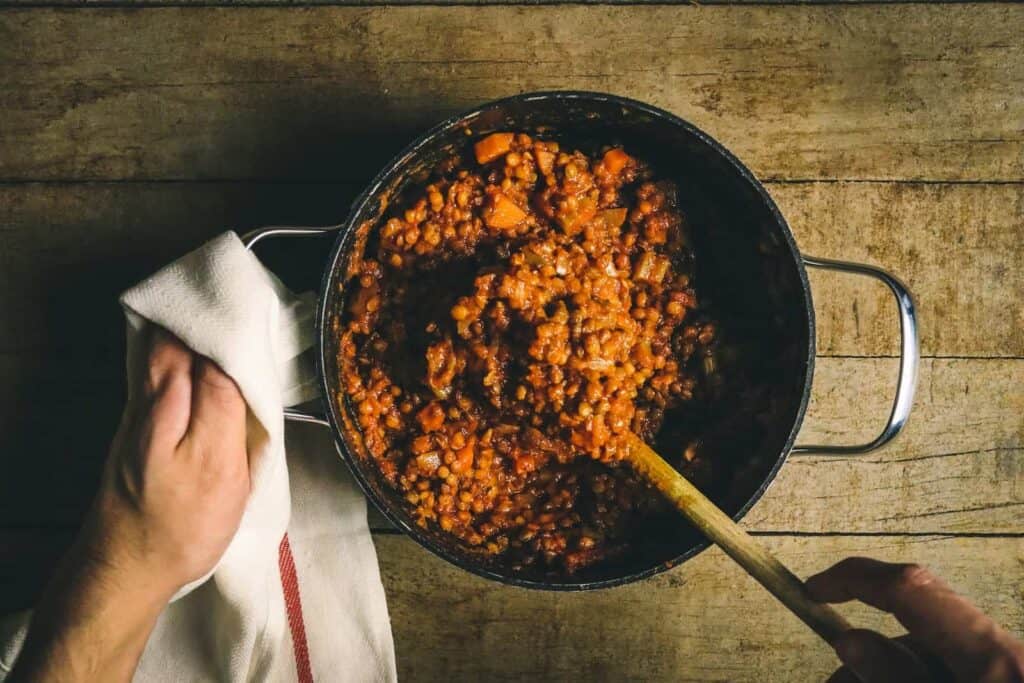Lentils are a key source of nutrients like protein, fiber, folate, potassium and phosphorus. But who has the time to cook them from scratch every day? Can you freeze lentils for convenience without sacrificing nutrition?
Can You Freeze Lentils?
You can store cooked lentils or freeze lentil soup in the freezer for up to 6 months, or canned lentils for 2 months. When you’re ready to eat them, defrost them in the microwave, fridge, or warm water before adding them into your dish.

Can You Freeze Dried Lentils?
If you follow these simple rules, your dried lentils will have a long shelf life. They can last for over 2 to 3 years if kept in a cool and dry place, in an airtight container.
Washing and freezing dried lentils might work, but you won’t get much use out of it because you will still need to cook them once they are thawed. It’s better to freeze cooked lentils since it will save you time and energy.
Can You Freeze Canned Lentils?
If you have leftover canned lentils after making a dish, can you freeze them for later?
If you have leftover canned lentils, don’t fret! You can easily save them for later. Just rinse the lentils with cold water and store them in an airtight container, sealable plastic bag, or freezable jar. If stored properly, they will keep well in the fridge for up to 4 days or in the freezer for around 2 months. When you’re ready to use them again, simply add directly to hot dishes like casseroles or stews.
How to Cook and Freeze Lentils
Before freezing lentils, we recommend cooking them so they will be more useful to you when thawed. Lentils don’t require soaking and long cook times like beans do, but brown lentils and green lentils take 30 to 35 minutes.
Follow these steps to cook and freeze lentils:
To cook the lentils, start by rinsing them well to get rid of any stones, debris, or pebbles. Next, put the lentils into a pot with cold water covering them by half an inch. Bring the mixture to simmer and boil for 20 to 30 minutes. Keep in mind that cooking time will depend on the type of lentil you’re using.
While boiling the lentils, be sure to keep an eye on them and add water if needed to keep them covered. Once they are done cooking, strain the lentils. You know they’re perfectly cooked when they are not too soft or too crunchy. If time allows, leave the strained lendils on the strainer longer to get rid of as much moisture as possible – this is key because too much water will make them sticky once frozen.
Before freezing, separate the lentils into serving sizes. The smaller the portions, the less time you’ll spend thawing them later. Pour the lentils or lentil soup into airtight plastic bags or containers, but don’t overfill; as freezing causes expansion, leave some extra space at the top of each container or freezer bag. Finally, label each with today’s date and the portion size.
How Long Do Cooked Lentils Last in the Freezer?
Frozen cooked lentils or fresh frozen can be stored for up to six months in the freezer. After the six-month mark, they will still be safe to eat as long as you have kept them in an airtight container.
How to Defrost Frozen Lentils
If you’re looking for a speedy, filling dinner option, look no further than defrosted lentils.
Defrost Lentils in the Microwave
To cook your frozen lentils quickly, put them in a microwave-safe bowl and zap them on medium to high for 2 to 3 minutes. Once they’re done, you can use them however you’d like in any recipe!
Defrost Lentils in the Fridge
If you don’t need the lentils right away, put them in the fridge to defrost. Frozen lentils? No problem! Simply transfer the bag into the refrigerator and let it sit until they’re fully defrosted.
Can You Freeze Lentils? – Bottom Line
Freezing cooked lentils or fresh lentils is good. You can freeze lentils for future use, whether they are cooked or uncooked. Just make sure to rinse, cook, and store them properly in airtight containers or bags to keep them fresh and avoid any freezer burn. And remember – frozen lentils can last up to six months in the freezer! So go ahead and stock up on those lentils- they’re a nutritious, protein packed addition to any meal.
You Might Also Like…
How to Preserve Fresh Banana Leaves
- Can Baked Beans Be Frozen
- Can Canned Mushrooms Be Frozen
- Can Healthy Living Become An Obsession
- Can You Freeze A Cheese Sauce
- Can You Freeze Baked Potatoes
- Can You Freeze Bean Sprouts
- Can You Freeze Brie
- Can You Freeze Cabbage Soup
- Can You Freeze Canned Fruit
- Can You Freeze Caramelized Onions
- Can You Freeze Cooked Pumpkin
- Can You Freeze Cornbread
- Can You Freeze Dried Figs
- Can You Freeze Focaccia
- Can You Freeze Lentils
- Can You Freeze Limes
- Can You Freeze Olives
- Can You Freeze Pureed Avocado
- Can You Freeze Salad

